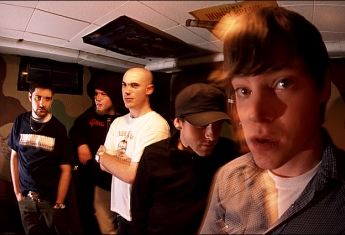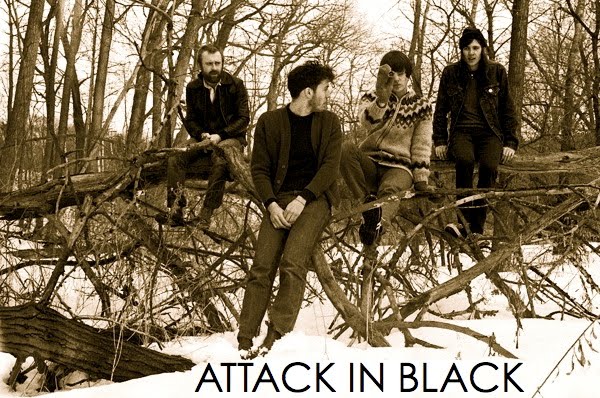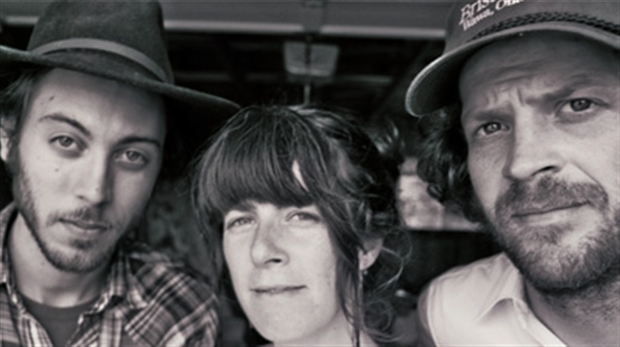 Music
Music
The ongoing guide to Attack in Black
by Mark Teo
May 22, 2014
Photo: Via CBC.ca
It’s hard to believe that we’re looking at Attack in Black, a folk-punk-indie rock act who rose to prominence in the mid-aughts, in the rearview mirror. That’s because, in the years since the Welland, ON band’s breakup, its members have become Canadian music staples: Daniel Romano and Ian Kehoe help run You’ve Changed, a consistently excellent label who’s manning the re-release of the Constantines landmark Shine A Light. Ian Romano briefly spent time in Wade MacNeil’s non-Alexisonfire, non-Gallows punk band, Black Lungs. Its members can be found producing, co-starring, and supporting on countless records, from Steve Lambke’s Baby Eagle to the Weather Station’s Tamara Lindeman’s pastoral folk project. Indeed, everything Romano, Romano, Burton, and Kehoe touch turns to gold—but before they fractured outwards, there was AiB. And this is our tribute to them.
A Day and a Deathwish

Photo: Via Reverbnation.com
Rosy-cheeked bassist Ian Kehoe was the driving force behind this proto-Attack in Black project, and even if A Day and a Deathwish didn’t share sonic similarities to AiB, they offer insights into the band’s eventual development. Playing an octave chord-riddled brand of positive hardcore, ADAAD found their niche in the 905’s hardcore circles—the same scene that birthed Keep It Up and Alexisonfire. AiB stalwarts Spencer Burton and Daniel Romano also spent time in the band (their Facebook page lists Romano’s role as “everything”), and the lessons learned from hardcore—fat-free songwriting, a penchant for dramatic arrangement—is evident in AiB’s future projects.
“Ian writes about 90 per cent of it,” Burton told Rose City Hardcore, a video zine. “He’s really the genius behind most of the tunes.” That genius would unfold again in Attack in Black, even if Kehoe wasn’t a founding member.
Attack In Black

Photo: attackinblack.blogspot.com
By 2005, Attack in Black—Spencer Burton, Oldie WhathisnameTK, and Daniel and Ian Romano to start, before Ian Kehoe joined—emerged from Ontario’s punk scene. At their inception, AiB were clearly hardcore-influenced: Though less breakdown-heavy than A Day and a Deathwish, their self-titled debut EP garnered comparisons to the melodicore of the day—namely, Strike Anywhere.
After being scooped up by Dine Alone, though, Romano and co. started making staggering leaps forward. The Widows EP and the Marriage LP—especially the latter—sculpted the sound best-associated with the band. Part Former Clarity-era Against Me! (see: the horns and brash, non-lyrical chorus of “Young Leaves”), part vintage Canadian folk comp (see: the sprawling banjo of “Northern Towns”), and part book-obsessed (their press materials namedropped Bukowski and Miller), they foursome were a musical anomaly: It was credible enough for the punks, but had enough earworms for the CBC-music crowd.
Curiously, it was an album that took two passes—Dine Alone didn’t like the initial cut, and the band re-recorded the LP. “I started to agree that the recording seemed really weird, that it didn’t represent us as I thought we sounded,” says Ian Romano told then-Exclaim!writer (and current AUX producer) Sam Sutherland.”Me and Dan, at least, were fighting a lot. It got to the point where we were arguing so much that I got too frustrated with what was going on and kind of… punched him in the face while he was driving, and then got out of the van. While it was moving.”
The hastily recorded Curve of the Earth followed less than six months later, and while it sounded nothing like Marriage, it displayed a band becoming polarized: Each member made individual contributions, and here, each member’s musical tendencies were showed raw—Romano’s burgeoning country obsession, Burton’s gentle folk, Kehoe’s love of fuzzed-out ’90s indie rock. “We all listen to lots of different kinds of music,” Daniel Romano told Exclaim in 2008. We don’t really want to stop ourselves from doing anything we want at any time so we don’t. So whatever element we happen to be in it always luckily seems to be the same one.”
2010’s Years (by One Thousand Fingertips) felt like a final attempt to capture that element—and the result was an altogether pleasant folk-rock effort. More consistent than Curve, it was a strikingly gentle turn for the band—the bits of distortion sprinkled on the album were almost Constantine-esque (see: the mid-tempo “Liberties” and “Moon of Day”), while on its quieter cuts, Romano pushed his vocal range (see: “Brownness of Her Curls”). And while Years was a wonderful, if underrated, record, it would be their last—the band quietly announced their dissolution soon after.
Check their split with Baby Eagle below—including a spoken-word rendition of “Marriage.”
Daniel, Fred and Julie

Of course, Romano’s folk inspirations were always evident—though his level of nerdery became evident in 2009, with the release of Daniel, Fred and Julie, made up of Romano and two East Coast music mainstays, Fred Squire (of Shotgun and Jaybird) and Julie Doiron (of Eric’s Trip). Their LP was flawless—with Squire and Romano splitting songwriting and Doiron providing spot-on harmonies, the trio produced a handful of authentic Depression-era folk, largely achieved through stripped-down recording techniques (the trio recorded with a four-track and a single $40 microphone.) Squire says the trio were inspired by the likes of Ramblin’ Jack Elliott and Woody Guthrie, and those influences would soon rear their heads in Romano’s solo work.
Much of the project was driven by Romano, and accordingly, Daniel, Fred and Julie even shared thematic similarities with his first album, Working For the Music Man. So, what themes did they explore? “Depression. Living in a shitty city,” Romano told Discorder. “That type of song, really evoking and being evoked through me because of the shitty situation I was in.”
Daniel Romano

Photo: Via CBC.ca
While most members of Attack in Black still make music, few have had careers as successful as Romano. And to his credit, the evolution of his musical abilities continued to evolve, even after AiB dissolved. Working For the Music Man evolved the stripped-down folk he displayed with Daniel, Fred and Julie—with heaps of hilarious, but spot-on, cynicism toward the music biz. Sleep Beneath the Willow saw him stretch his vocal range—see: Romano’s newfound murder-ballad baritone—but also found him testing out a new country obsession, with Waylon and Willie, Townes Van Zandt, and Lee Hazlewood all looming as evident influences.
Normaltown Records noticed, and scooped Romano up—he’d previously put out records on his You’ve Changed imprint, co-run with Kehoe and Constantines / Baby Eagle member Steve Lambke. 2013’s Come Cry With Me followed, and it was nothing short of masterful: Armed with inventive storytelling (see: “Chicken Bill,” the trans farmer) and Grand Ole Opry-worthy backups by Weather Station’s Tamara Lindeman and Bruce Peninsula / Timber Timbre’s Misha Bower, and an eye for theatrical Nudie suits, Romano arrived as a country singer. Come Cry With Me felt like an authentic ’60s country artifact—and that’s no fluke.
“I’m pretty well obsessed with country-western, and nearly every aspect and branch of it, even some of the newer stuff,” he told me, in an interview for Fast Forward Weekly. “But I also love the performance of it. I really love the stuff from the ’60s — that era was very much a performance, from the way you dressed to the words you spoke between songs. It’s how music and entertainment should be. I mean, even Neil Young — who looks like a chum bum — made that his thing.”
Spencer Burton

While AiB guitarist Spencer Burton has been known to accompany Daniel Romano live, he also embarked on a solo career of his own. Burton’s been prolific, too: Under his own name and the Grey Kingdom moniker, he’s put out three LPs and a handful of EPs since 2011. And while his transformation hasn’t been as stark as Romano’s, Burton’s evolution—and his contributions to AiB—have become much clearer in his solo work.
Blending smooth, acoustic-driven folk, slide-guitar drenched country, and reverbed-out keyboards, his solo outings allowed Burton to exhibit his true strength—his powerful, crystal-clear vocals. His 2012 LP, Light I’ll Call Your Name Out “Darkness”, added bigger-band arrangements, but was also the darkest contribution to the AiB canon: Oscillating between lonely, open-road sparsity (“Dark Passing of Love”), campfire approachability (“Place to Call Home”) to existential ruminations (opener and standout “End Of God”), Burton emerged as the most straight-faced and poetic of his peers.
Curiously, he might’ve emerged as AiB’s best chef, too. “I’ve perfected my whiskey marmalade recipe. I can’t tell you how I’ve done it,” he told us last year. “Just know that it’s been done. Nothing can change with it from this day forward. That, and I have also made the most perfect cod chowder.” Spencer: Can you send our office some of that marmalade? [ed: AND CHOWDER TOO PLEASE?]
Marine Dreams

Photo: Via pigeonrow.com
Ian Kehoe’s songwriting talents were evident, even from his early days—according to Exclaim!, he wrote the lyrics to AiB’s Marriage. In his Marine Dreams project, he also reveals himself as a damn decent pop songwriter—even if his output has been scattered.
Both LPs Kehoe has released as Marine Dreams are winners. His eponymous 2011 debut saw him dabbling with fuzzy garage—it’s easy to hear the influence that Halifax power pop had on his debut. But just as Kehoe—and his signature, near-bashful vocals—established himself as a force in retro-leaning Cancon indie-pop, he cut Corner of the Eye. Laying Kehoe’s pop sensibilities bare, he reinvented himself yet again: Leaning on jangly 12-string guitars, he constructed an album of sun-filled pop abilities. “Roots Come After Lengthy Waits” almost sound like a grown-up Attack in Black songs—and we mean that in the best possible way.





